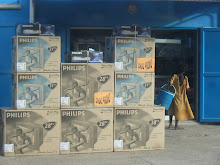Over my winter break I went to the Gambia and Ziguinchor in the Casamance region of Senegal with 2 friends, Emily and Caitlin. We took a seven-place Peugeot taxi to the Gambia. The three of us were cramped in the back seat, which was elevated above the other seats. Our driver had a penchant for driving in adjacent fields instead of staying on the bumpy pothole filled roads. When we go to the border of Senegal and the Gambia we were greeted in English. It was shocking, bizarre, and disconcerting for me to hear English being spoken by Gambians. I cannot figure out why it was so hard for me to swallow but I just could not get used to it. I also could not get used to English and Wolof being mixed together. I am too accustomed to “city Wolof” which in Dakar means a mix of French and Wolof that most people speak. Banjul, the capital of the Gambia, was unimpressive. It resembled an overgrown village with dusty streets and shops that close at 7 pm. We left Banjul early because of the lack of activities and headed to Serrakunda, which is a village/city transportation hub. The road to Serrakunda was the worst I have ever experienced bar none. It was so awful that I cannot begin to describe the size of the potholes. While in Serrakunda, we visited an animal and nature preserve, which reminded me of a rainforest hike in Costa Rica. The most exciting part about our time in Gambia, in my opinion, was seeing monkeys. While the Gambia was lush and beautiful outside of the cities, I was relieved to leave. I never thought I would be so excited to be back in Senegal, speaking “city Wolof” and being accosted by men calling me ‘Madame.”
I think one large difference between the Gambia and Senegal boils down to colonialism. It is obvious when visiting the Gambia that the British only wanted the land because of the river, which bisects the country. The only thing that they gave the country was churches. There were more churches in Banjul than imaginable for a predominately Muslim country. The British put no effort into development or schooling. The roads were horrible, the buildings are dilapidated, and the list continues. The lack of schooling is evident in the signs hung from stores and restaurants. I have never seen so many spelling or grammar errors in my life. Ironically, even the department of education building had an egregious grammatical error. We ate at a restaurant that advertised “stake and chips” and past several barbershops that offered, “barbering” as well as being called saloons. To me, it shows that the English just took what resources they could from the Gambia and left the people there to handle the consequences and be poorly educated. At least the French educated Senegalese people while raping their resources. It is said that Senegalese speak better French than the French.
Casamance is an incredibly beautiful region. We had an amazing experience in Ziguinchor, which restored my faith in Senegalese terranga (hospitality). Emily, Caitlin, and I were in search of the river so we could sit and feel at peace instead we happened upon Emma. Emma is an amazing woman who invited us into her house to meet her family. After greeting about ten members of the family we stopped to talk her wheelchair bound grandmother who lived in Italy for 35 years. I think we really bonded with her and her older sister. We were invited to stay for lunch, which we politely declined but drank some homemade palm wine and promised to return the following day for lunch. We did and ate a delicious dish from the Casamance. Later we went to Christmas mass with the family, since they are a Catholic family. After mass we celebrated and danced in their living room until the wee hours of December 25. We came back the following day to help prepare lunch and to say goodbye. It was such an incredible experience to be welcomed into a stranger’s home whom wants nothing but to talk and get to know people from other cultures. It was also nice to get to know people in the area and learn about them. Being with Catholics was a big change for us since the three of us live in “very Muslim households.” Emily (Mymunah), Caitlin (Rakkhi), and I (Sufi/ Sophie) gushed for hours after first meeting the family about how generous they were. We could not get over how open and kind these people were to us. It was very hard to leave them. If we want to we can go to Emma’s sisters wedding on January 6 but after taking the 16 hour boat back to Dakar, I don’t think I am up for the trip.
Wednesday, December 27, 2006
Subscribe to:
Post Comments (Atom)

No comments:
Post a Comment